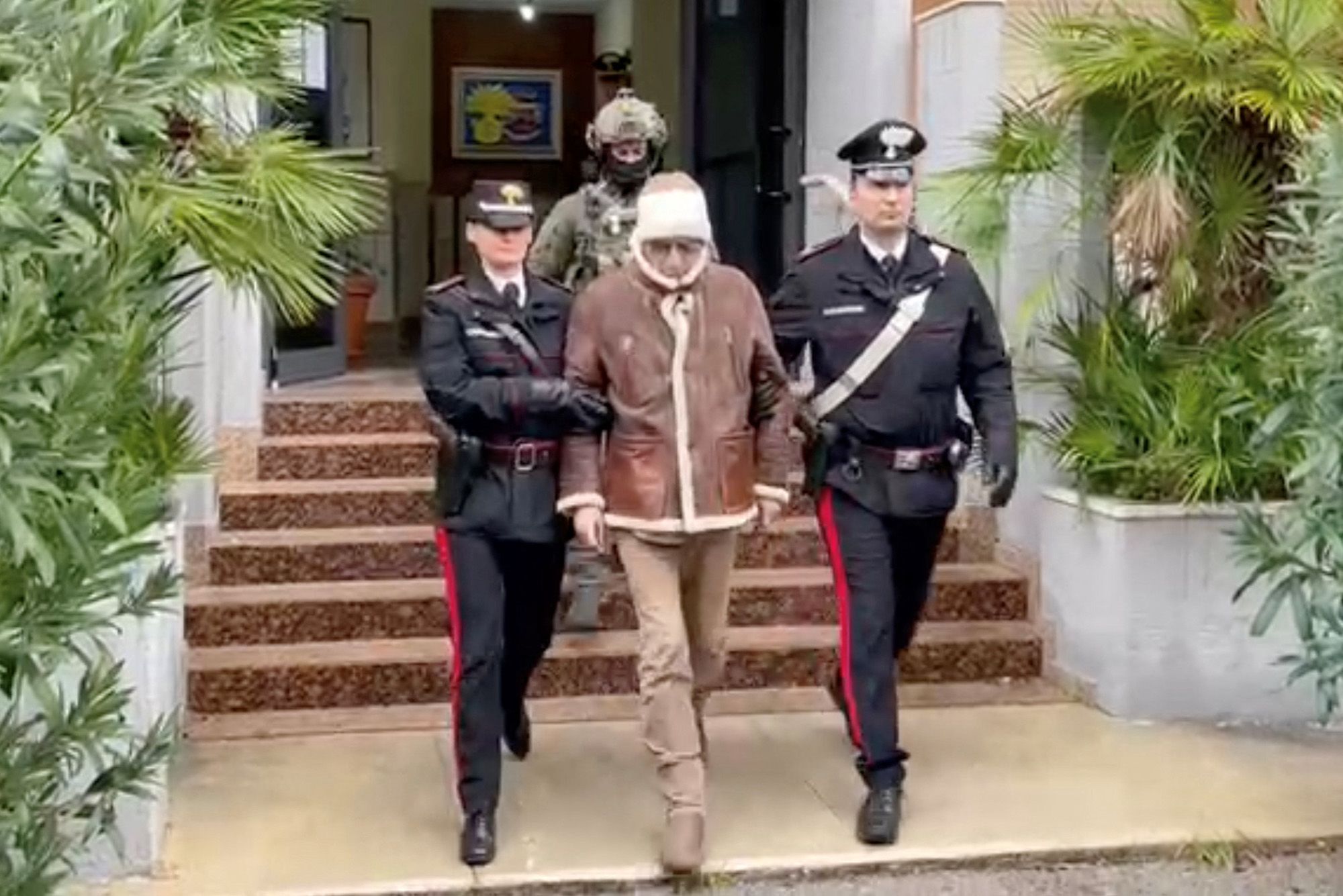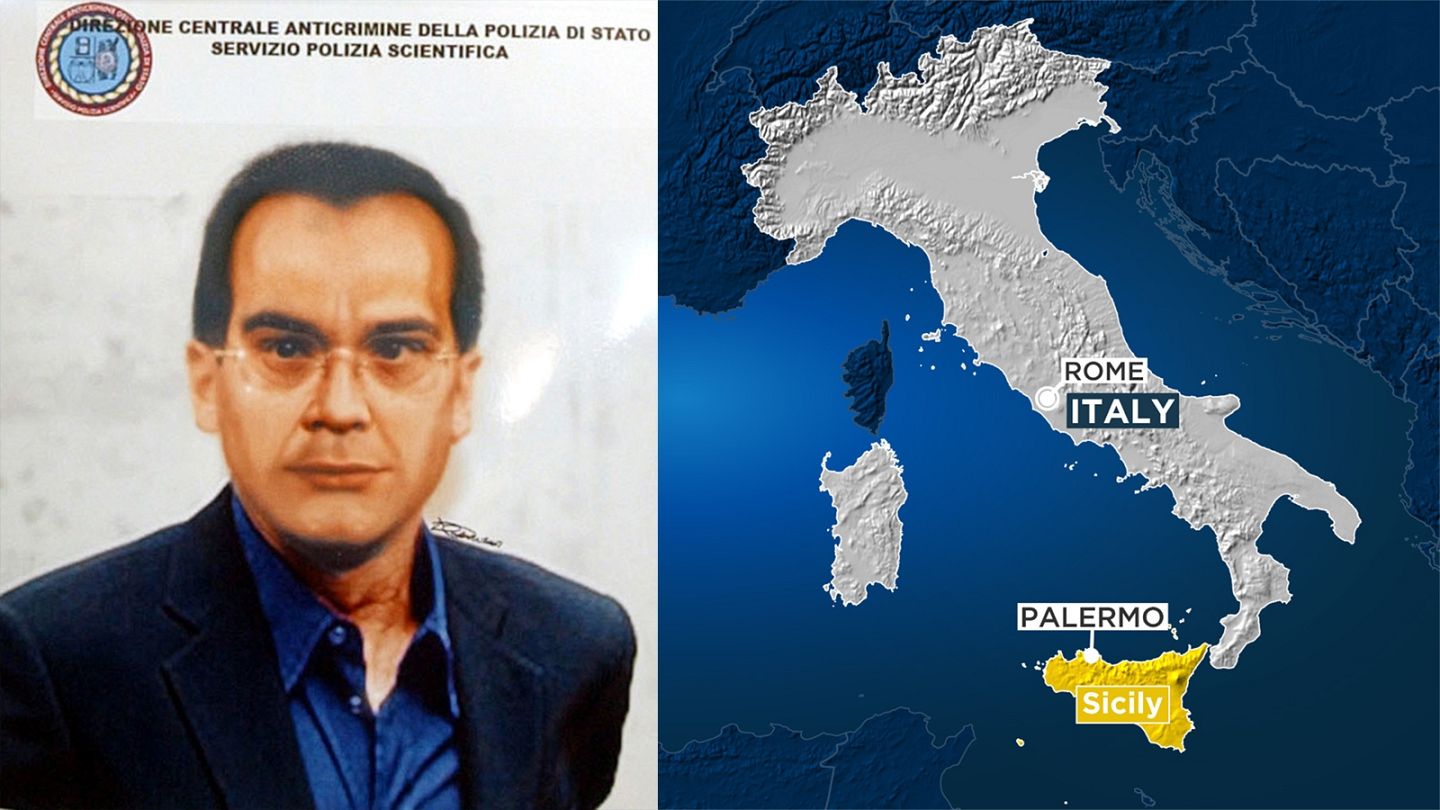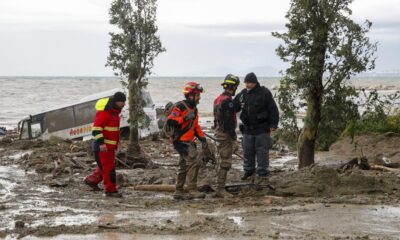World
Italy: No 1 wanted Mafia boss held after 30 years on the run

ROME, Italy – Matteo Messina Denaro was caught at a private clinic in Sicily on Monday after being on the run for 30 years. He was a convicted Mafia boss who ordered some of the most brutal killings in the country.
According to Carabinieri Gen. Pasquale Angelosanto, who heads the police force’s special operations team, Messina Denaro was apprehended at a Palermo clinic where he received treatment for an unidentified medical issue.
In the pouring rain, he was brought down the front steps of the posh clinic by a pair of Carabinieri officers, each holding one arm. Messina Denaro was dressed in a brown leather jacket with shearling trim, a matching white-and-brown skull cap, and his signature tinted glasses. His face seemed tired, and he was staring straight ahead.
He was a young man when he went into hiding and is now 60 years old. Even though he was on the run, Messina Denaro was thought to be the most powerful Cosa Nostra leader in Sicily. His power base was the port city of Trapani in western Sicily.
Top Level Mafia Boss
He was the last of three top-level Mafia bosses who had been on the run for decades but had never been caught. Hundreds of police officers had spent years trying to find him.
Italian news outlets say that when Carabinieri asked the fugitive in the clinic if he was Messina Denaro, he said that he was.
Palermo Chief Prosecutor Maurizio De Lucia said that the fugitive was going by the alias Andrea Bonafede. The surname approximately translates to “trustworthiness” in Italian.
Messina Denaro went before a Palermo court shortly after his detention, where a judge sought to check his identity and asked basic questions to fill out paperwork.
When the judge reminded Messina Denaro that he had to answer truly, he replied, “Aware.” When asked what he did for a living, he said “farmer,” adding that his brother was a banker and his four sisters were housewives.
Trapani Italy The Base Of His Crime Clan
According to detectives, he gave the address Castelvetrano, a farm village near Trapani that was the power base of his crime clan and where he was assured of logistical support during his period as a fugitive.
He also informed the court that he was one of six children, one of whom worked in finance.
The brief session finished with Messina Denaro saying to the unidentified judge, “Thank you, good day.”
Messina Denaro faces several life sentences after being tried in absentia and convicted of hundreds of killings.
He is scheduled to be imprisoned for the 1992 bombs in Sicily that murdered senior anti-Mafia prosecutors Giovanni Falcone and Paolo Borsellino, and Falcone’s wife and several of his bodyguards. He was also convicted of the murder of a Mafia turncoat’s young boy, who was abducted and strangled before being dissolved in a vat of acid.
30 Years After The Capture Of “Boss of Bosses.”
The arrest happened 30 years and a day after the capture of convicted Mafia “boss of bosses” Salvatore “Toto” Riina in a Palermo apartment on Jan. 15, 1993, Messina Denaro went into hiding in the summer of the same year when the Italian state tightened its grip on the Sicilian criminal syndicate in the aftermath of the Falcone and Borsellino killings.
Giorgia Meloni, the prime minister of Italy, says that Messina Denaro’s arrest is a “major success of the state” that shows it won’t give up against the Mafia.
Bernardo Provenzano, the head of the Mafia in Italy, was caught in a farmhouse in Corleone, Sicily, in 2006. He had been on the run for 38 years, setting a record for the longest time. Once Provenzano was apprehended, the emphasis shifted to Messina Denaro, who eluded capture until Monday despite multiple confirmed sightings.
The fact that the three senior executives were eventually apprehended in the heart of Sicily while living a hidden life for decades would not surprise Italy’s police and prosecutors. According to law enforcement, such bosses rely on contacts and the confidentially of fellow mobsters and complicit family members to move them from hideaway to hideout, providing food, clean clothing, and communication, as well as an omerta code of silence.
He Had A String Of Lovers On The Run
On the other hand, according to investigators, Messina Denaro traveled overseas while a fugitive, notably to Marseille, a French port city, where he got surgery some years ago.
Riina and Provenzano spent their final years in the harshest Italian jail conditions designated for unrepentant organized crime bosses, refusing to cooperate with authorities.
Messina Denaro was thought to have led a more luxurious life while hiding from police for decades, leading some to assume that he could help with authorities in exchange for more lenient jail circumstances.
According to Italian media reports, he had a string of lovers during his years on the run and spent time playing video games.
One of his girlfriends was arrested and convicted of keeping him hidden for a period while he was on the run. While he had a weakness for women, Messina Denaro could be cruel, according to Italian media, strangling a pregnant woman.
He Kept In Touch With Lovers
Messina Denaro wrote a letter to his then-girlfriend shortly after going into hiding, claiming, “You’ll hear gossip about me, they’ll depict me like the devil, but it’s all falsehoods,” ANSA reported.
Mafia bosses frequently utilize handwritten notes known as “Pizzini” to avoid being tracked down by cellphone use. When police apprehended Provenzano in his rustic, almost primitive hideaway in the countryside, they discovered a stockpile of such notes.
With the 1990s crackdown on Sicily’s Cosa Nostra, the island’s Mafiosi began to lose their influence in Italy compared to other organized crime syndicates.
While a small army of traitors considerably damaged the Sicilian Mafia, the ‘ndrangheta syndicate, situated in the “toe” of the Italian peninsula, progressively surpassed Cosa Nostra in reach and power on the mainland. Unlike the crime syndicates of Sicily, the ‘ndrangheta recruits its footsoldiers through familial ties, making it less vulnerable to turncoats. The ‘ndrangheta is today one of the most powerful cocaine smugglers.
However, the Sicilian Mafia continues to operate narcotics trafficking enterprises. Other lucrative illegal businesses include the infiltration of public works contracts and the extortion of small business owners who are threatened if they do not pay “protection money” every month.
SOURCE – (AP)
World
Phones, Islamic Books And Currency Exchange. Some Businesses Are Making Money Out Of Taliban Rule

KABUL, Afghanistan Taliban – Yunis Safi, a Kabul businessman, understands how important it is to show off your phone if you want something done.
“In Afghanistan, your phone is your personality,” he remarked, beaming, his hands adorned with jewel-encrusted rings. One has an emerald, the other a large Russian diamond. “When you go to a meeting with the government, the better your phone, the more they respect you.”
Safi owns a phone business in the exclusive Shar-e-Naw area. An armed guard stands outside. The iPhone 15 Pro Max is now on store shelves, priced at $1,400. He has customers willing to part with this amount of money, which may surprise some, considering the country’s economic troubles and that more than half of the population relies on humanitarian help for survival.
Afghanistan’s finances were precarious even before the Taliban took power in 2021. The budget relied significantly on foreign help, and corruption was rampant. The seizure shattered Afghanistan’s economy, freezing billions of dollars in international finances and forcing tens of thousands of highly skilled Afghans to flee the country with their money.
AP – VOR News Image
Phones, Islamic Books And Currency Exchange. Some Businesses Are Making Money Out Of Taliban Rule
Despite the terrible conditions, some businesses benefit under the Taliban administration. Women are relegated to customers, however, because authorities have forbidden them from most jobs, including retail. None of Safi’s 78 employees are female.
He has tapped into a varied client base, including those eager for the latest iPhone release and those who prefer simple devices. The latter account for the majority of his sales and range in price from $20 to $200.
The Taliban used to target phone towers and threaten telecom companies, accusing them of working with the United States and other international forces to detect insurgent movements via mobile phone signals. Now, they’re investing in 4G mobile networks.
The Communications Ministry reports that 2 million new SIM cards have been issued in the last two years, and subscriber numbers are increasing. Enayatullah Alokozai, a ministry official, stated that the government is investing $100 million in telecom and has completely rebuilt hundreds of towers.
There are 22.7 million active SIM cards in a country with a population of 41 million. Ten million are for phone calls, with the remainder for mobile internet.
According to Trade Ministry estimates, phone imports have increased. More than 1,584 tons of phones entered Afghanistan in 2022. Last year, it weighed 1,895 tons.
Safi said he had many Taliban customers, and the younger ones prefer iPhones. “Of course, they need smartphones. They use social media and enjoy making videos. The iPhone offers stronger security than Samsung. The camera’s resolution, CPU, and memory are all improved. Afghans use smartphones like everyone else.”
Safi has the iPhone 15 Pro Max, an Apple Watch Ultra, and three automobiles.
Business was difficult shortly after the Taliban took power, but it is improving, according to Safi. “The people buying the new release iPhones are the ones with relatives abroad sending money to Afghanistan.”
AP – VOR News Image
Phones, Islamic Books And Currency Exchange. Some Businesses Are Making Money Out Of Taliban Rule
Remittances are a lifeline, but less than half of what they were before the Taliban took power and the financial system collapsed.
At Kabul’s rowdy Shahzada Market, hundreds of money changers clutch stacks of the local currency, the Afghani, and noisily hawk their wares. They occupy every floor, stairwell, corner, and cranny.
According to Abdul Rahman Zirak, a senior official at the money exchange market, $10 million changes hands every day. The diaspora sends largely U.S. cash to family, which they convert for Afghani.
Before the Taliban took control, there were more ways to donate money to Afghanistan. However, there are no longer any linkages to SWIFT or international banking, which is one of the main reasons why business is brisk in the market, he said.
“The work of money exchangers has increased and strengthened,” he stated. “Money transfers come from Canada, the U.S., Europe, Australia, Arab nations and other neighboring countries.”
Trade becomes extremely chaotic during the holidays. During the holy month of Ramadan, 20,000 people visited the market daily, and it took more than 90 minutes to enter, he claimed.
Our business may suffer if the restrictions are lifted and the assets are unfrozen. But I don’t see this happening. Many do not have bank accounts. Unemployment is rising, therefore people send money to Afghanistan. Our company will be needed for years to come.”
Irfanullah Arif, who owns Haqqani Books, a specialist retailer of Islamic manuscripts, is likewise pleased with his fortunes. His consumers are primarily religious school professors and pupils.
There are at least 20,000 madrasas in Afghanistan. The Taliban intends to build more. Last year, the supreme commander allegedly directed the recruiting of 100,000 madrassa teachers.
AP – VOR News Image
Phones, Islamic Books And Currency Exchange. Some Businesses Are Making Money Out Of Taliban Rule
While Arif’s business suffered, along with everyone else’s, from the chaos that followed the takeover, there was another cause. “All the students left the madrassas and went to work for the (Taliban) government,” Arif claimed.
Success, however, comes with a price. Arif imports everything, and the Taliban are just concerned with collecting revenue, even from Islamic literature.
Arif pays a tax of 170 Afghanis ($2.36) for a carton of 100 books, with a shipping cost of 500 Afghanis ($6.95). His bookstore’s taxes have increased under the Taliban administration.
“That’s why books are expensive in Afghanistan,” he sighed. “With the increase of madrassas, our trade has gone up, but so have the taxes.”
SOURCE – (AP)
Election News
India’s Modi Continues to Slam Muslim During 2024 Election Campaign
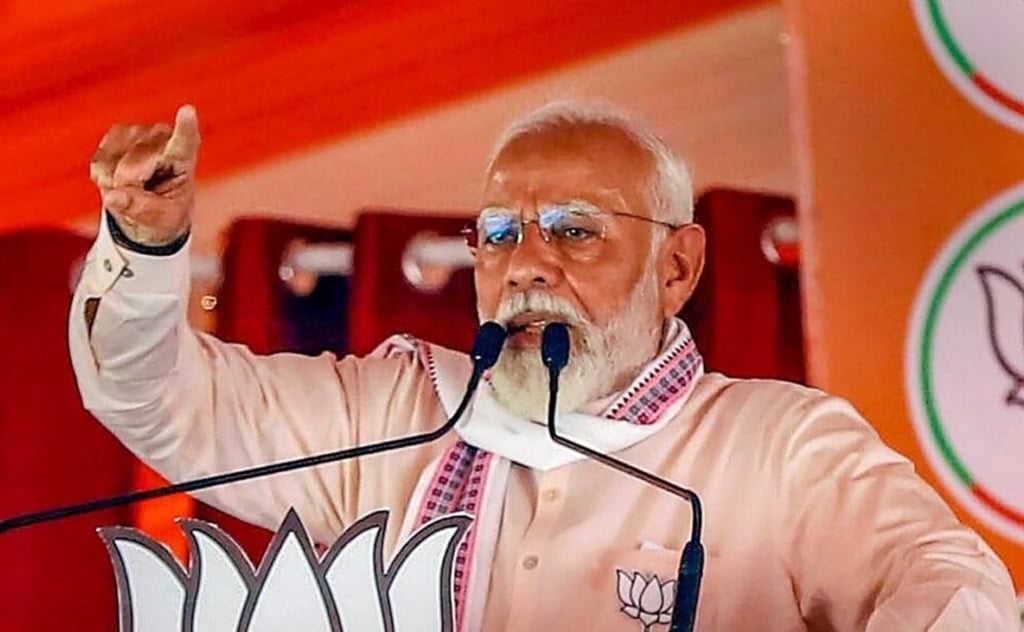
Indian Prime Minister Narendra Modi has stepped up divisive rhetoric against Muslims throughout the election campaign, using some of the most harsh language of his decade in power to bash opponents and mobilize Hindu voters as his party seeks a historic third term.
Modi has referred to the country’s Muslim minority as “infiltrators” in a series of rallies since India’s general election began on April 19, likened his Bharatiya Janata party’s arch-rival Indian National Congress to the historic pro-Pakistan Muslim League, and accused Congress of attempting to “loot” wealth from Hindus and redistribute it to Muslims.
“Congress wants to take part of the rights of [lower-caste Hindus] and give it to their vote bank,” Modi said during a campaign event in Goa on Saturday. “And you know who Congress’s favourite vote bank is,” he added, making a thinly veiled reference to Muslims.
The same day, Anurag Thakur, the BJP’s communication minister, warned another crowd that Congress “wants to give your children’s property to Muslims”.
Modi’s intensification of aggressive rhetoric comes as the BJP seeks to rally support among Hindus, who account for over 80% of the population, in order to gain a super-majority and entrench its domination in national politics.
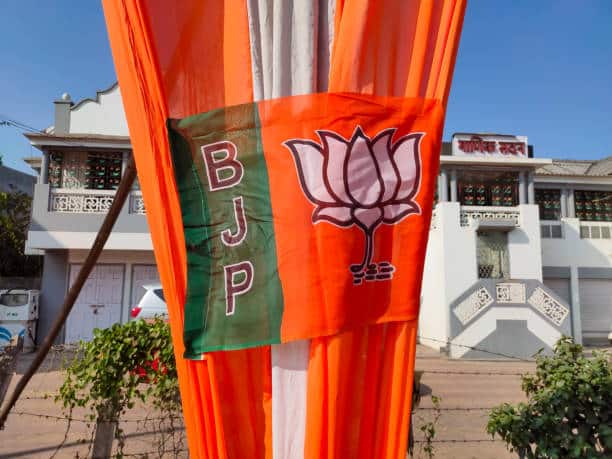
Flag or election symbol of Bhartiya Janata Party: Getty Images
Modi Ups his Hindu Muslim Rhetoric
The BJP aims to win 370 of the 543 available parliamentary seats, up from 303 in 2019. The results will be announced on June 4, following six weeks of delayed voting.
However, observers who consider the Hindu nationalist BJP as the favourites believe this goal will be difficult to achieve, citing evidence of a dip in turnout during the first two rounds of voting and anti-incumbency feeling in portions of the ruling party’s northern heartland.
“I don’t think I have seen a prime minister speak such inflammatory rhetoric,” said Asim Ali, an independent political analyst, adding that Modi was attempting to “energise the Hindutva [Hindu nationalist] base”.
“Because the prime minister is saying this now, local level BJP operatives are free to take it up.”
The divisive turn has enraged Modi’s detractors, who have filed complaints with India’s electoral commission for suspected violations of the code of conduct. The body sent a notice to the BJP last week, but did not identify Modi and has yet to take action.
During a rally in Agra, home to the Taj Mahal monument erected by a Muslim Mughal ruler, Modi accused Congress of pandering to religious minorities.
“The politics of appeasement has divided the country into pieces,” Modi claimed, claiming that opposition parties are attempting to “steal” from Hindus. Muslims make up approximately 14% of India’s population.
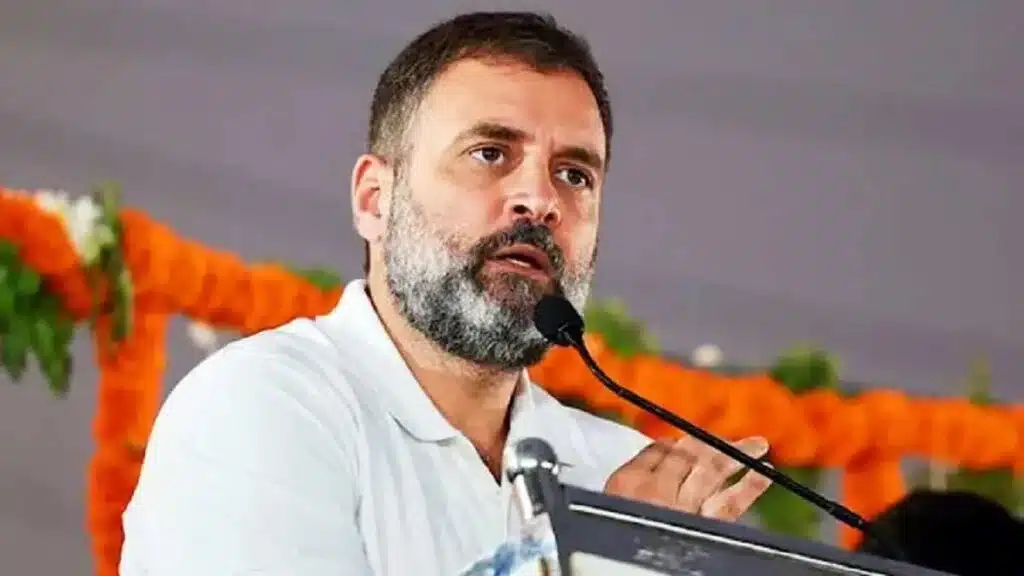
Defence Congress leader Rahul Gandhi: Getty Images
India’s Rahul Gandhi Steps Up Pressure
Congress denies these allegations, accusing the business-friendly BJP of diverting government funding to billionaires while ignoring unemployment and inequality. It has promised to conduct a caste census, which it claims will help allocate resources to underprivileged communities.
Rahul Gandhi, a Congress leader and Modi’s most visible opponent, said on Friday that Modi appeared “very nervous”.
“Narendra Modi has snatched money from the poor . . . [and] given it to the billionaires,” he claimed. “We will give that money to the poor people of India.”
Because India has tight restrictions forbidding the publication of exit polls during the election, there is no confirmed information about any party’s standing.
However, many doubt that the BJP, which swept much of India in 2019, would be able to considerably increase its seat total.
Reaching 370 seats appears to be “a bit of a puzzle, as to where the extra seats are going to come from,” according to Ronojoy Sen, a political scientist at the National University of Singapore, who speculates that the objective may have been designed to motivate party cadres.
Both Hindu and Muslim voters in Agra expressed dissatisfaction with the campaign’s provocative tone. Rizwan Ahmed, 18, said there was “no such problem” between faiths, but “politicians just say things and then people twist the statements”.
“This kind of polarisation and communal rhetoric, of course it’ll appeal to your core voters,” Sen said in a statement. “But I’m not sure how well it works in expanding the core.”
Source: Financial Times
Business
Global Negotiations On A Treaty To End Plastic Pollution At Critical Phase In Canada
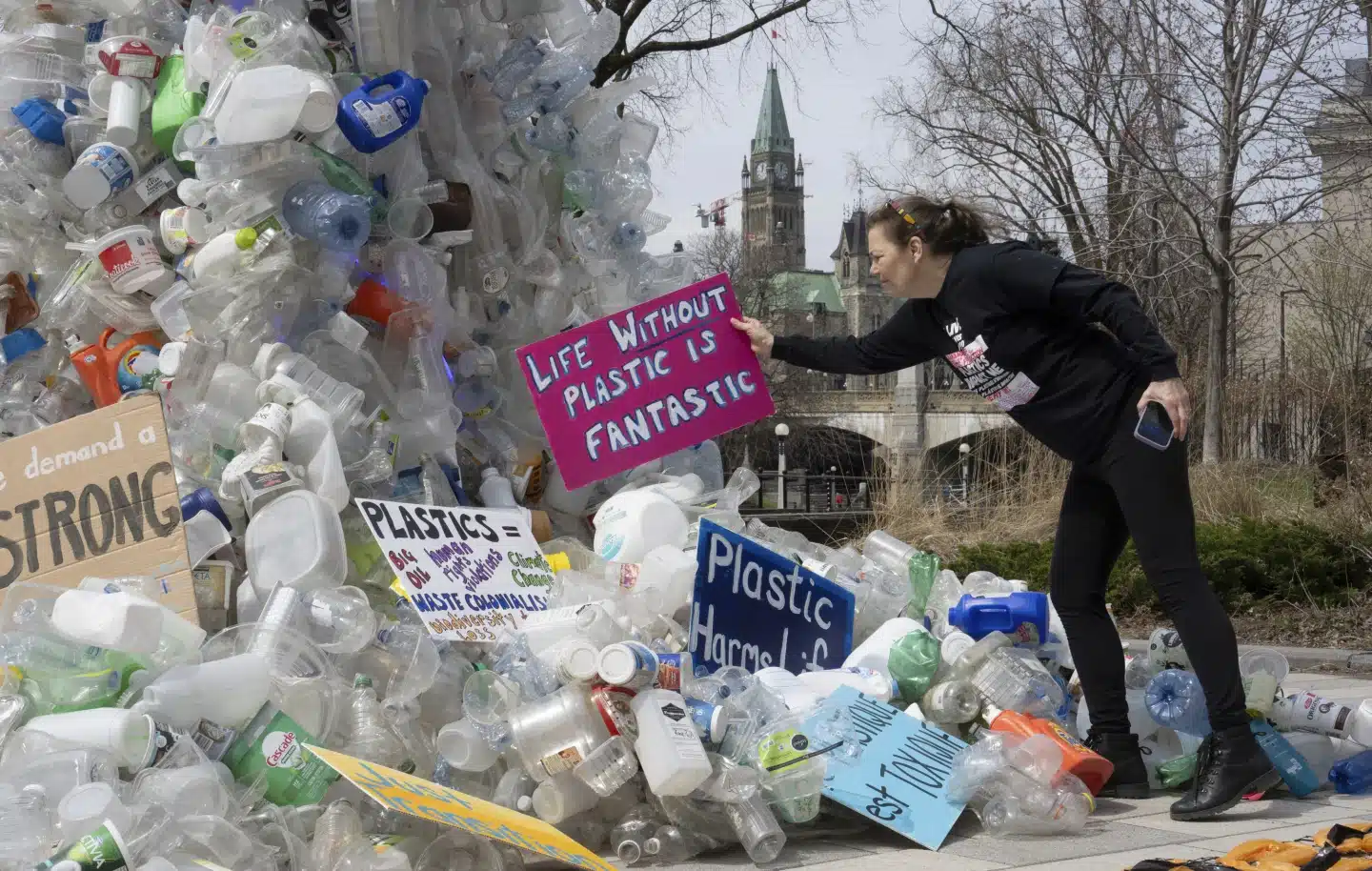
Ontario, Canada. Negotiators from most states are currently discussing the draft of a worldwide treaty aimed at eradicating plastic pollution, marking the first instance of such negotiations.
Delegates and observers at the Intergovernmental Negotiating Committee on Plastic Pollution regarded it as a positive development, and discussions have transitioned from conceptualization to the formulation of a treaty at this fourth out of five planned plastics summits.
The concept of internationally restricting the production of plastic is highly controversial. The document continues to exist despite the vehement opposition from countries and companies involved in plastic production, as well as oil and gas exporters. The majority of plastic is derived from fossil fuels and chemical compounds.
The Ottawa session was set for late Monday or early Tuesday. During Monday night’s meeting, there was a heated debate about whether the working groups should prioritize the issue of plastic manufacture before the upcoming and final meeting.
AP – VOR News Image
Global Negotiations On A Treaty To End Plastic Pollution At Critical Phase In Canada
According to Stewart Harris, a representative of the International Council of Chemical Associations, the members are advocating for a treaty that specifically addresses the recycling and reuse of plastic, sometimes known as “circularity.”
Many scientists from the Scientists’ Coalition for an Effective Plastics Treaty attended the meeting to present scientific facts on plastic pollution to negotiators. Their objective was to counteract any misinformation that may be circulating.
Bethanie Carney Almroth, an ecotoxicology professor at Sweden’s University of Gothenburg and coalition co-leader, stated that yesterday’s claim about the lack of microplastic data is factually incorrect. In reality, there have been 21,000 published articles on micro and nanoplastics. “It resembles the game Whac-A-Mole.”
AP – VOR News Image
Global Negotiations On A Treaty To End Plastic Pollution At Critical Phase In Canada
According to her, scientists have been subjected to harassment and intimidation by lobbyists. She informed the United Nations that a lobbyist shouted directly at her during a meeting.
Ecuador’s lead negotiator, Walter Schuldt, stated that despite their divergences, the countries represented have a shared objective of advancing in the treaty process.
“In the interview, he emphasized that we are discussing the preservation of life in the future, encompassing not only human life but also all forms of life on Earth,” he stated.
He expressed his pride in participating in and contributing his small but meaningful effort to the worldwide initiative to tackle an environmental issue.
The negotiators’ objective is to finalize a treaty by the conclusion 2024. The topics given to expert working groups by tonight will progress to the final stage of discussions in autumn in South Korea.
Without undertaking this preparatory work in between meetings, it would be intimidating to successfully conclude the negotiations within this year. Several nations expressed their dedication to collaborating during the intervals between talks on Sunday evening.
The treaty negotiations commenced in Uruguay in December 2022, and Rwanda and Peru’s subsequent submission of the resolution initiated the process in March 2022.
Progress was sluggish at the Paris discussions in May 2023 and the Nairobi talks in November as countries deliberated about the process’s regulations.
Upon the arrival of numerous negotiators and observers in Ottawa, Luis Vayas Valdivieso, the committee chair from Ecuador, reminded them of their objective and urged them to exhibit ambition.
“We have a responsibility to create a new treaty that will stimulate and direct the necessary actions and global collaboration to achieve a future devoid of plastic pollution,” he stated. “We must not disappoint them.”
The delegates have discussed the treaty’s scope, chemicals of concern, problematic and avoidable plastics, product design, and financing and implementation.
Delegates also simplified the cumbersome assortment of choices from the previous meeting.
Many individuals journeyed to Ottawa from communities impacted by plastic manufacture and pollution. Residents residing near petrochemical plants and refineries in Louisiana and Texas distributed postcards to the U.S. State Department with the message, “We desire your presence.”
AP – VOR News Image
Global Negotiations On A Treaty To End Plastic Pollution At Critical Phase In Canada
The members of the Break Free From Plastic movement journeyed collectively and urged negotiators to personally witness air and water contamination in their regions.
“This remains the most optimal choice we possess to witness transformation in our communities.” Corporations heavily influence them. Jo Banner, a St. John the Baptist Parish resident in Louisiana, expressed their inability to attend the local government. “It seems that this is my sole opportunity and source of optimism to assist my community in recovering and finding solace.”
Members of an Indigenous Peoples’ Caucus held a news conference on Saturday. They expressed concern that microplastics are polluting their food supply. They emphasized that this pollution threatens their communities and ways of life, which are guaranteed to them indefinitely. They perceived a lack of acknowledgment of their opinions.
“Our stakes are larger.” “These are our hereditary territories that are being contaminated with plastic,” Juressa Lee, a resident of New Zealand, expressed following the occurrence. “We are individuals or groups who possess legal rights, rather than individuals or groups with an interest or involvement in a particular issue.” We should be granted greater autonomy in expressing our opinions and judgments than individuals responsible for the issue.
Historically, plastic was not present, but currently, in the Bay of Plenty, the sediment and shellfish, which serve as their seafood supply, are contaminated with little plastic particles. Lee stated that they consider nature’s “resources” as valuable assets.
“Indigenous methods can serve as a guiding force,” Lee stated. “The current approach we are taking is evidently ineffective.”
Vi Waghiyi journeyed from Alaska to advocate for the rights and interests of Arctic Indigenous communities. She emphasizes to decision-makers the need to ensure that this pact provides long-term protection against plastic pollution for future generations.
She stated that their purpose in being here is to serve as the moral compass, ensuring that the decisions made are in the best interest of all individuals.
SOURCE – (AP)
-
Entertainment5 months ago
Robert Downey Jr. Won’t Be Returning To The Marvel Cinematic Universe As Tony Stark
-
Politics5 months ago
Unveiling the Power and Influence of The Conservative Treehouse
-
Sports4 months ago
Saints’ Aggressive Play-Calling Ends Up Coming Back To Hurt Them In Loss To Rams
-
Celebrity5 months ago
Norman Lear, Producer Of TV’s ‘All In The Family’ And Influential Liberal Advocate, Has Died At 101
-
Innovation5 months ago
Sony Debuts First PS5 Controller For Disabled Gamers
-
Business4 months ago
Nike Says It Will Cut $2 Billion In Costs In A Major Warning For Consumers


